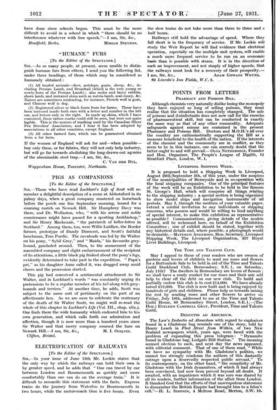ELECTRIFICATION OF RAILWAYS
[To the Editor of the SPECTATOR.]
SIR,—In your issue of June 18th Mr. Leckie states that the only way by which the railways can hold their own is by greater speed, and he adds that " One can travel by car between London and Bournemouth as quickly and more comfortably than one can do on the average train." It is difficult to reconcile this statement with the facts. Express trains do the journey from Waterloo _to Bournemouth in two hours, while the motor-coach time is five hours. Even the slow trains do not take more than three to three and a • half hours. . .
RailWays still hold -the advantage of speed. Where they fall short is in the frequency of service. If Mr. Leckie will study the Weir Report he will find evidence that electrical operation, especially on the multiple unit system, will enable a much more frequent service to he, run on an economic basis than is possible with steam. It is in the directiou.of such an improvement, and not simply of, higher speeds, that the railways must look for a recovery of their prosperity.—






































 Previous page
Previous page